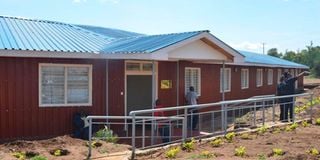Kathwana, Tharaka Nithi County headquarters without a bank, supermarket

A section of the newly constructed offices at Tharaka-Nithi headquarters in Kathwana market.
In 2012, during the advent of devolution, more than 300 delegates drawn from Tharaka, Maara and Chuka/Igambang’ombe constituencies met and agreed on Kathwana to be the headquarters of Tharaka Nithi County.
There were the choices of established towns-Chuka, Marimanti and Chogoria which are the constituencies’ headquarters but the leaders settled on Kathwana, a village market in Igambang’ombe Sub-County due to its centrality and enough space for expansion.
Other factors included favourable climate and proximity to the Ena-Kathwana-Meru highway and the Lamu Port-South Sudan-Ethiopia Transport (Lapsset) corridor.
The leaders had seized the opportunity to plan Kathwana from scratch, free from the encumbrances that come with a developed urban centre and envisioned that in five years, a city would be blossoming.
Since there were no existing offices at Kathwana, the first governor, Samuel Ragwa was hosted at a nearby Kenya Water Institute, Chiakariga campus for months before he built an office.
The county boss also built iron-sheet-made semi-permanent offices for the staff while the Members of the County Assembly held their first plenaries under a tent before erecting temporary chambers using iron sheets.
Mr Ragwa started the building of Sh400 million and Sh360 million executive offices and chambers respectively in 2015 which are still incomplete.
The five-storey executive building is at the roofing stage while the assembly has stalled at the foundation since 2015.
With the vision of an upcoming city, investors flocked the area to buy land leading to the increase of prices from Sh50,000 to Sh500,000 for 50 metres by 100 metres parcels of land within the market in the first two years.
On the outskirts of the market, an acre of land rose from Sh100,000 to Sh2 million within the first four years.
Some investors started building and establishing businesses but the county headquarters population was still very low because those working in the county government offices came in the morning and left in the evening.
After 10 years of devolution, all national government officers led by the county commissioner who are supposed to operate from Kathwana are still stuck in Chuka town in Chuka/Igambang’ombe constituency, about 30 kilometres away.
County assembly offices and some of the executive offices are still in Chuka town making Kathwana a ceremonial headquarter where leaders only come for official functions and leave to their areas of comfort.
The incumbent governor, Muthomi Njuki also stopped working from Kathwana after the court barred him from accessing the office until a Sh34.9 million corruption case he is facing is heard and determined.
The county boss went to Chuka town and established a satellite office where he operates from.
Until recently, the market remained dusty and without reliable clean domestic water but Mr Njuki tarmacked about a one-kilometre stretch connecting his office with the highway and around the central business area and also provided water.
He also built a Sh127 million open-air market and the governor’s residence while works on the county assembly speaker and deputy governor residences are ongoing.
The county headquarters does not have a public hospital but there is a branch of Komarock Modern Healthcare, a private facility and there is no mainstream bank apart from two saccos, Transnational Sacco and Solution Sacco.

Summertom Hotel in Kathwana market in Tharaka-Nithi County on July 31 2015.
There is no shopping mall or a supermarket and there are only two hotels that offer accommodation-Sammerton Hotel and Restaurant owned by Mr Ragwa and Coolmont Restaurant.
Investors have lost hopes of Kathwana growing into the envisioned city and land prices have since reduced almost by half with those who bought at high prices disposing of them at a loss.
The building of the 31km Chuka-Kanwa-Kaare road which started in 2014 stalled at six kilometres and the contractor left.
The key road which is in a deplorable state connects the county headquarters to Chuka town which is the devolved unit’s main commercial centre.
Keria-Mautuni-Kathwana and Gatunga-Marimanti Chiakariga roads that are supposed to connect Maara and Tharaka constituencies to Kathwana also stalled.
Many people argue that elected leaders are not serious about lobbying for the completion of the key roads because they want to remain operating from the developed towns.
Kathwana business people have been holding demonstrations demanding both national and county government officers who are supposed to operate from Kathwana to move there to spur the economy.
Kathwana Business Community secretary Henry Kimwere, said during a recent demonstration that local leaders are to blame for the underdevelopment of Kathwana.
He said apart from Mr Ragwa who built a hotel, the rest of the political leaders invest in other towns and in the neighbouring counties.
“The growth of Kathwana has been intentionally sabotaged by leaders who have remained in Chuka town and failed to provide the necessary incentives for businesses because they have also invested in other towns,” said Mr Kimwere.
Gubernatorial candidates, Prof Erastus Njoka (Jubilee), Dr Mzalendo Kibunjia (Narc Kenya), Gitari Mbiuki (Chaka cha Kazi) and Kaugi Mbona (independent) who are seeking to unseat Njuki are basing their campaigns on developing Kathwana into a modern city.
Mr Njuki has promised to do more developments if reelected in the August 9 polls and dismissed those accusing him of sabotaging the growth Kathwana.
“I have already achieved several development milestones at Kathwana and given a second term I will do more including tarmacking roads,” said Governor Njuki at Kathwana while opening a newly constructed Sh127 million open air market.





